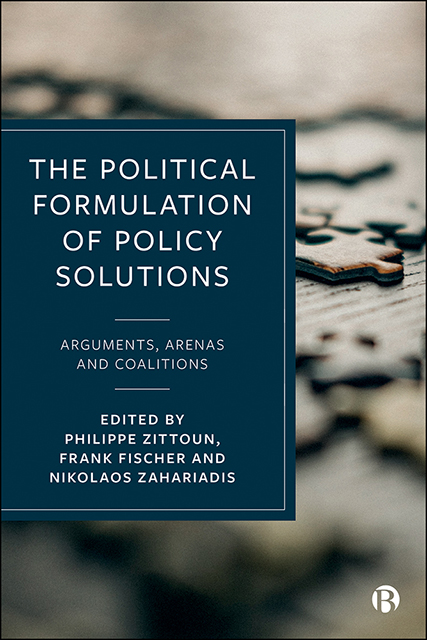Book contents
- Frontmatter
- Contents
- Notes on Contributors
- 1 Introduction – Policy Formulation: A Political Perspective
- 2 Upcycling a Trashed Policy Solution? Argumentative Couplings for Solution Definition and Deconstruction in German Pension Policy
- 3 Binding and Unbinding Problem– Solution Associations in US Agricultural Policy Making: The Introduction and Demise of Direct Payments to Farmers
- 4 The Role of Expert Reporting in Binding Together Policy Problem and Solution Definition Processes
- 5 Coalitions and Values in the Flow of Policy Solutions
- 6 The Marks of Ownership: The Promotion of Carbon Capture and Storage in France
- 7 Anticipating Public Approval in the Binding of Immigrant Integration Problems and Solutions
- 8 Discourse Coalitions and the Messiness of Policy Solutions: College Governance in Nevada
- 9 Policy Solution Ownership: Road-Space Re-Allocation as a New Approach to Urban Mobility
- Index
9 - Policy Solution Ownership: Road-Space Re-Allocation as a New Approach to Urban Mobility
Published online by Cambridge University Press: 21 April 2023
- Frontmatter
- Contents
- Notes on Contributors
- 1 Introduction – Policy Formulation: A Political Perspective
- 2 Upcycling a Trashed Policy Solution? Argumentative Couplings for Solution Definition and Deconstruction in German Pension Policy
- 3 Binding and Unbinding Problem– Solution Associations in US Agricultural Policy Making: The Introduction and Demise of Direct Payments to Farmers
- 4 The Role of Expert Reporting in Binding Together Policy Problem and Solution Definition Processes
- 5 Coalitions and Values in the Flow of Policy Solutions
- 6 The Marks of Ownership: The Promotion of Carbon Capture and Storage in France
- 7 Anticipating Public Approval in the Binding of Immigrant Integration Problems and Solutions
- 8 Discourse Coalitions and the Messiness of Policy Solutions: College Governance in Nevada
- 9 Policy Solution Ownership: Road-Space Re-Allocation as a New Approach to Urban Mobility
- Index
Summary
This chapter analyses the emergence, construction, and trajectory of road-space re-allocation as a policy solution to urban mobility challenges. In a context of growing pressure on urban road networks and rapidly developing new technologies, a number of policy solutions have been introduced, including developing sustainable modes of transportation, promoting alternative land-use patterns, encouraging the development of new road-space functions, and going beyond transportation objectives in order to integrate a wider range of urban policy objectives (Anciaes and Jones 2020). Beyond this wide range of policy solutions to restrain car use, a new holistic approach to road-space re-allocation has recently emerged in policy discourses. Understood as a policy solution to be applied city-wide, the dynamic management of urban roads is promoted globally as part of an agenda to shape the ‘future of urban roads’ and locally by a new generation of urban leaders. This approach is explicit in slogans such as ‘More urban life for all’ (City of Copenhagen, 2013), Streets for all (Transport for Greater Manchester, 2017), and the ‘15 minutes city’ (City of Paris, 2020). It is listed under the ‘4 emerging concepts that could transform cities’ by the WRI Ross Center for Sustainable Cities, a global think tank seeking to create more prosperous and liveable cities (Maassen and Galvin 2019). More fundamentally, it aims at scaling up from a myriad of micro-level experimentations (Castàn Broto and Bulkeley 2013) to promote a standardized, metropolitan-wide approach to the negative externalities resulting from car-centric urban development and density.
How did this new understanding of road-space re-allocation emerge in policy discourses? Can it be traced back to the role of specific policy entrepreneurs with an interest in claiming ownership over a specific policy solution? To what extent does claiming policy solution ownership and the authority to oversee its implementation contribute to re-politicizing the issue at stake? Focusing on the concept of ‘policy solution ownership’, understood as establishing the authority to name a social problem and bind it to a specific policy solution (Gusfield 1989, p 433), this chapter contributes to the book's main argument in three different ways.
- Type
- Chapter
- Information
- The Political Formulation of Policy SolutionsArguments, Arenas, and Coalitions, pp. 173 - 190Publisher: Bristol University PressPrint publication year: 2021

